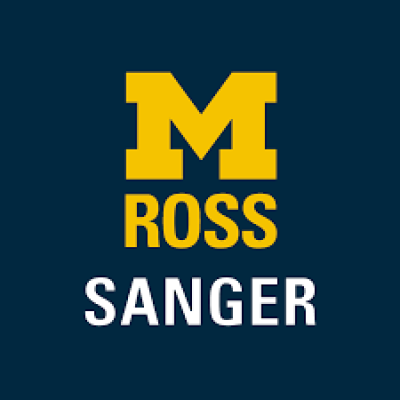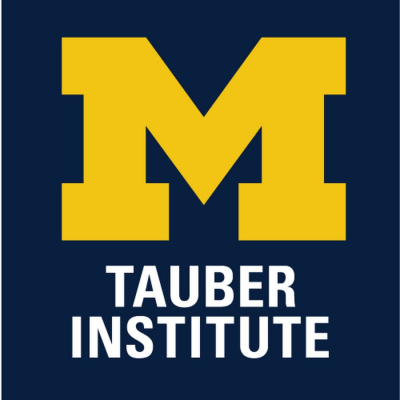Explore the faculty research, thought leadership, and groundbreaking philosophies that established Michigan Ross as one of the world’s top business schools.

Professor C.K. Prahalad was the major pioneer and advocate of the 'bottom of the pyramid' proposition that selling to the poor can simultaneously be profitable and help eradicate poverty. While appealing, the BOP proposition is also controversial. Professor Aneel Karnani was an early and prominent critic of the BOP proposition. In his 2007 article "The Mirage of Marketing to the Bottom of the Pyramid" and his 2011 book Fighting Poverty Together: Rethinking Strategies for Business, Governments, and Civil Society to Reduce Poverty, he argues for an alternative perspective. Rather than viewing the poor primarily as consumers, it is better to focus on the poor as producers and to emphasize buying from the poor. Both the private sector and government have a critical role to play in alleviating poverty. The best way to alleviate poverty is to raise the real income of the poor by providing them appropriate employment opportunities. The private sector is the best engine of job creation. The government should facilitate the creation and growth of private enterprises in labor-intensive sectors of the economy. The government should also fulfill its traditional, accepted functions of providing adequate access to public services, such as education, public health, drinkable water, sanitation, security, and infrastructure.

Professor Dudley Maynard Phelps, who was part of the Michigan Business School faculty from 1924-67, studied and wrote about the distinct marketing environments and challenges in markets as diverse as Latin America, Western Europe, and the former Soviet Union, including work for the U.S. State Department. He received recognition for this work from the International Marketing Institute and was president of the American Marketing Association. In the 1980s, Professor Vern Terpstra continued this work and authored the most widely used text on international marketing and other books on the cultural environment of international business, and also published highly impactful research on country-of-origin effects with his PhD student C. Min Han. Terpstra was president of the Academy of International Business in 1970 and was invited to teach at several universities.
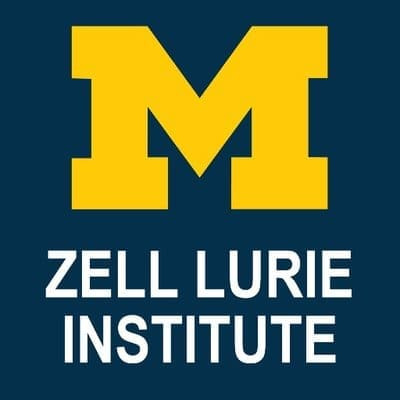
Established by Samuel Zell and Ann Lurie in 1999 as the first entrepreneurial studies program at the University of Michigan, the Zell Lurie Institute for Entrepreneurial Studies plays a vital role in developing the next generation of entrepreneurs and venture investors. The Institute offers various programs, competitions, and academic courses that give students the knowledge, skills, and motivation to develop a growth mindset and succeed as entrepreneurs.
Since its inception, the Institute has supported more than 9,100 entrepreneurs. It provides students with hands-on experience in entrepreneurial environments where they create, lead, and shape innovative ventures.
The Institute also supports venture investing and plays a key role in connecting entrepreneurs with venture capital and grant funding. This access to funding is crucial for entrepreneurs looking to start or scale their businesses and allows Ross students to act as real venture capitalists.
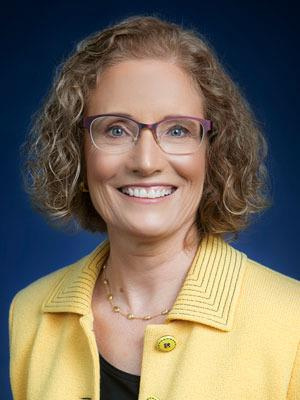
Since an article she published in the Iowa Law Review in 1995, Professor Dana Muir has worked in the field of fiduciary obligation, particularly as it relates to the investment of the almost $37 trillion in U.S. retirement assets, but also as it relates to a variety of other employee benefit plans. In her 1995 article, Muir explained that the courts' attempts to define fiduciary obligation using concepts from fourteenth-century trust law were misguided. Muir has subsequently addressed fiduciary concepts in the context of investment advice, the extent to which employers serve as fiduciaries of the plans the sponsor, and, most recently, in their application to the consideration of environmental, societal, and governance factors in the investment of retirement fund assets.
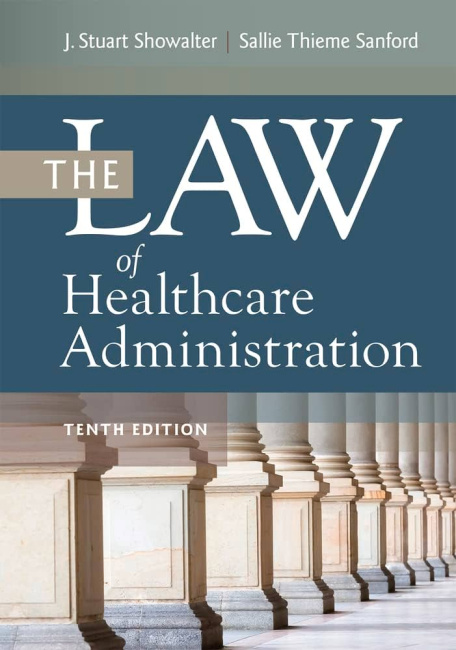
Changes in health care structure following World War II brought the need for increased legislation, regulations, and court oversight to the industry. Professor Arthur Southwick of the Michigan Business School was a leader in developing these diverse sources into a coherent framework that enabled academics, healthcare leaders, and students to understand this emerging area of law.
According to Wharton Professor Arnold Rosoff, Southwick's book, The Law of Hospital and Health Care Administration, first published in 1978, "was a central fixture in the field's literature and the means by which countless numbers of hospital administrators learned about the laws that so significantly defined their field of practice." In this way, Southwick was a thought leader in developing healthcare law. In addition to his intellectual leadership in the healthcare field, Southwick served on the State Health Planning Advisory Council in Michigan and played a key role in founding what has become the 12,500-member American Health Law Association.
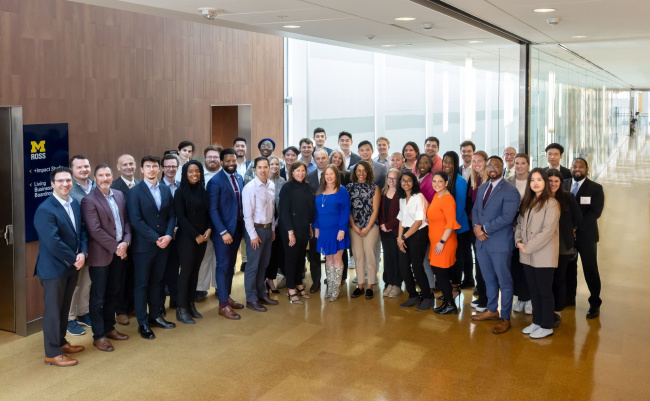
The Dare to Dream grant program is an initiative by the Zell Lurie Institute for Entrepreneurial Studies. It provides funding to U-M students interested in exploring and pursuing entrepreneurial ventures.
The student grant program offers three different tracks targeted toward early-stage students looking to develop a business concept to integrate entrepreneurship into their academic studies, students who have already developed a business concept and are seeking to validate and assess the feasibility of their idea, and students who are ready to launch their ventures.

The Michigan Business Challenge is a prestigious business plan competition hosted by the Zell Lurie Institute for Entrepreneurial Studies. It allows U-M students to showcase their entrepreneurial ideas, receive feedback from experienced judges, and compete for over $100,000 in cash prizes to support their ventures.
The Michigan Business Challenge was established in 1984 at Michigan Ross and has since become one of the region's most impactful and well-known startup competitions. Over the years, the MBC has supported numerous successful startups, generated millions of dollars in funding, and helped launch successful entrepreneurial careers for U-M students and alumni. The MBC is open to various stages of business concepts, from early-stage ideas to established businesses.
The competition consists of three tracks that cater to specific industry sectors, including the Seigle Impact Track for social ventures, the Invention Track for ventures that have intellectual property at the core of their high-tech venture, and the Innovation Track for growing startups. These tracks provide tailored resources, networking opportunities, and funding for participants. Notable entrepreneurial ventures that have come through the MBC include Morning Brew, Xoran Technologies, AMBIQ Micro, Elevate K-12, and many more.

The inception of the Journal of Public Policy and Marketing dates back to 1982 when it was founded by Tom Kinnear, a prominent faculty member from the Michigan Business School. Its initial name was Journal of Marketing and Public Policy. However, due to concerns raised by the American Marketing Association about potential confusion with the Journal of Marketing, it officially adopted its current name in 1983. The primary motivation behind the journal's creation was the growing interest among marketing academics in public policy during that era. During the 1970s and early 1980s, there was a growing interest in issues concerning the intersection of public policy and marketing. This interest encompassed various aspects, including advocacy for children's rights, as well as concerns related to other vulnerable groups such as the elderly, ethnic communities, and those with low income; the environmental impact of consumption and the emergence of what is now termed the "green consumer"; the adoption of energy-efficient practices by consumers following significant increases in gasoline, electric, and natural gas prices; evolving product liability doctrines that were becoming more lenient in terms of protective measures; food labeling and nutritional aspects; new consumer protection laws and measures. It is noteworthy that many of these trends are still relevant today, albeit with some shifts in emphasis, such as the increased focus on climate change.

The original trading floor at the Michigan Business School was established in 1999. At the time, it was the 12th academic trading lab to be developed in the United States and one of the first in a large public university.
Later, with a generous donation by John and Georgene Tozzi, a new lab was built. Over the years, thousands of students have come through the lab.
Today, there are approximately a dozen investment clubs, seven of which meet weekly in the lab. When the lab was first getting started, the student-managed fund was at $95,000, which has since grown to $700,000.
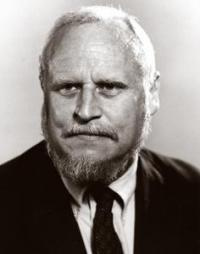
Michigan Ross has long been a pioneer in entrepreneurial education, introducing the nation's first course on entrepreneurship in 1927. However, in the early 1970s, Professor LaRue Hosmer played a pivotal role in championing entrepreneurship education at Ross. He developed and taught courses in small business management and a seminar on small business formation. He is considered the founder of the Michigan Entrepreneur Track and has also inspired present-day entrepreneurship faculty at Michigan Ross, including Professor Andy Lawlor. Lawlor was a student in Hosmer's entrepreneurial management course in 1973, and Hosmer has been an important mentor to Lawlor, helping to bridge the gap between business and teaching. Lawlor began guest lecturing under Hosmer's guidance in 1975 and assumed the teaching responsibilities for the entrepreneurship classes in 1981. Over the years, many successful companies have been born from Hosmer and Lawlor's teaching.
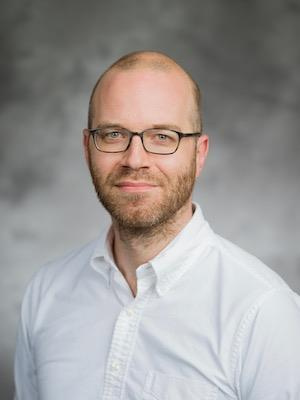
In 2021, Assistant Professor Andreas Hagemann developed a new econometric methodology that addresses the complexities of clustered data to enhance the accuracy and reliability of empirical work in economics and related fields. Typical examples of clusters are firms, cities, or states. The central challenge is that units within clusters may influence one another or may be influenced by similar environmental factors in ways that cannot be observed. Empirical researchers know that neglecting to account for clusters can yield results where non-existent effects erroneously appear as highly significant. Hagemann's research agenda developed new tools to address this issue in challenging and empirically relevant scenarios. His work has had a substantial impact on econometric theory and empirical practice. For instance, the methodology he developed is now the standard option for clustering in the canonical implementation of quantile regression in the statistical programming language R.
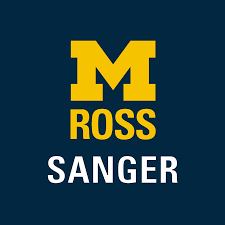
In 2006, Professor Sue Ashford, associate dean for leadership programming, founded the Ross Leadership Initiative, which was the precursor to the Sanger Leadership Center and one of the first organized leadership programs among business schools worldwide. The initiative was influenced by Ashford's research on learning leadership via experience and Professor Noel Tichy's action-based learning concepts. Suddenly students were not just learning about leadership but were actually engaged in doing it. Prominent among these efforts was the highly influential Leadership Crisis Challenge, which puts students in the hot seat needing to resolve a crisis in the moment. This program was recognized with the Provost's Teaching Innovation Prize in 2011 and remains a prominent and popular program in the school to this day. Later, under the leadership of Professors Scott DeRue and Gretchen Spreitzer, RLI grew and launched new programs that persist today, including Story Lab, the Ross Leaders Academy, and more. In 2015, alum Stephen W. Sanger, MBA '70, and Karen Sanger made a defining gift of $20 million to establish the Sanger Leadership Center. With the Sangers' gift, the Sanger Leadership Center, now under the leadership of Professor Lindy Greer, has created an array of custom programs and workshops and now offers leadership development programs for students across the university.

In the early 1990s, Professor Garry Brewer became dean of the U-M School of Natural Resources and the Environment. He approached Dean Joe White of the Michigan Business School with the concept of a dual-degree program to prepare future business leaders with an integrated education in both earth and management sciences. The concept took shape first in 1993 in the form of a graduate dual-degree program (originally called the Corporate Environmental Management Program) under the leadership of Professor Stuart Hart and then the Erb Institute after a generous grant from Fred and Barbara Erb in 1996 and a series of additional donations from other visionary donors. The dual-degree program was then incorporated into the Erb Institute and bolstered by the scholarly research of three newly endowed professorships. Nearly 30 years later, the Erb Institute has expanded dramatically to become a full-fledged, endowed institute with three chaired professors, an undergraduate Erb Fellows Program, more than 200 graduate and undergraduate students, and more than 750 alumni across 17 countries. In addition, the institute has an active agenda of scholarly and applied research and works to facilitate business engagement through business roundtables and global conference partnerships. Today, the Erb Institute is generally recognized as the leading business sustainability institute for research, teaching, and business engagement.

Since the COVID-19 pandemic, the public K-12 education system has faced significantly high teacher turnover and poor retention rates. Teachers have faced increasing pressure to achieve academic success while challenged with growing class sizes, reduced funding, and learning loss from the pandemic. This problem has been incredibly difficult to correct, and public school districts across the country have not been able to address it cost effectively.
In their paper, “Stopping the Revolving Door: An Empirical and Textual Study of Crowdfunding and Teacher Turnover,” Professors Samantha Keppler, Jun Li, and Andrew Wu conducted a study of data from the largest teacher crowdfunding site, DonorsChoose, to study the effect of crowdfunded projects on teacher retention. The team found that teachers are less likely to leave their schools and the state public school system when their projects are funded. Assessing teachers’ project request essays, they identified that teachers who received funding for unique projects or requested resources to improve their classroom environment had higher retention rates.
Their paper is the first to identify the effect of crowdfunding on teacher retention. It provides initial, strong evidence that the effect is positive, showing that teachers funded on DonorsChoose are 1.6 percentage points (pp) less likely to leave their schools and 1.9 pp less likely to leave the teaching profession — a 14% and 41% reduction versus baseline turnover and attrition rates, respectively.
Due to the demonstrated impact of teacher-driven crowdfunded projects, DonorsChoose has partnered with eight states to spend COVID-19 education relief funding on teacher crowdfunding projects. To date, these partnerships have funded over $100 million of teacher projects from over 100,000 teachers, impacting over 10 million students.
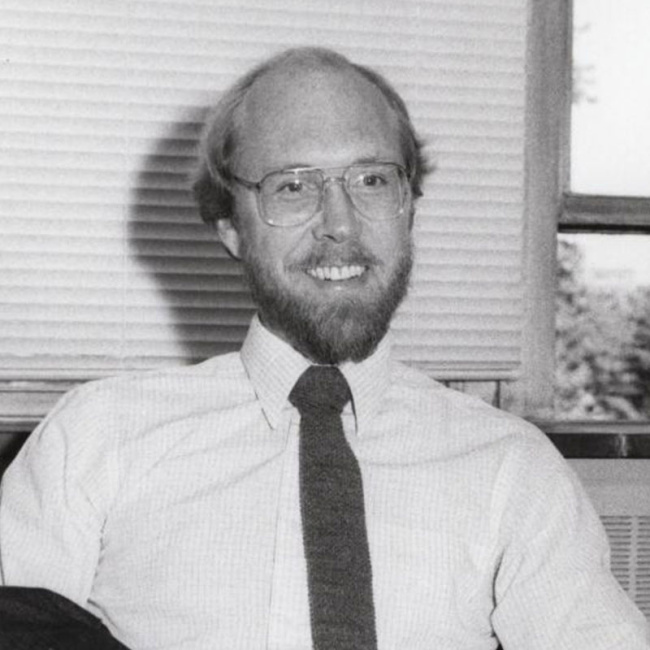
Michigan Ross is known for being one of the first places to promote and provide rigorous evidence contrary to the efficient market hypothesis. The work of Professor Victor Bernard, a faculty member from 1982-1995, played a huge role in the beginnings of literature on market inefficiency. His work in valuation and fundamental analysis was the first to provide evidence that investors could not fully process information in earnings releases. The inefficient markets argument was further supported by the work of Professor Richard Sloan, a faculty member from 1997-2007. Bernard demonstrated that market participants treat the two basic components of accounting — cash and accruals — in an irrational way when making their valuation of corporate securities. This behavior became known as the "accrual anomaly." Bernard's work twice won the Notable Contribution to the Accounting Literature Award.
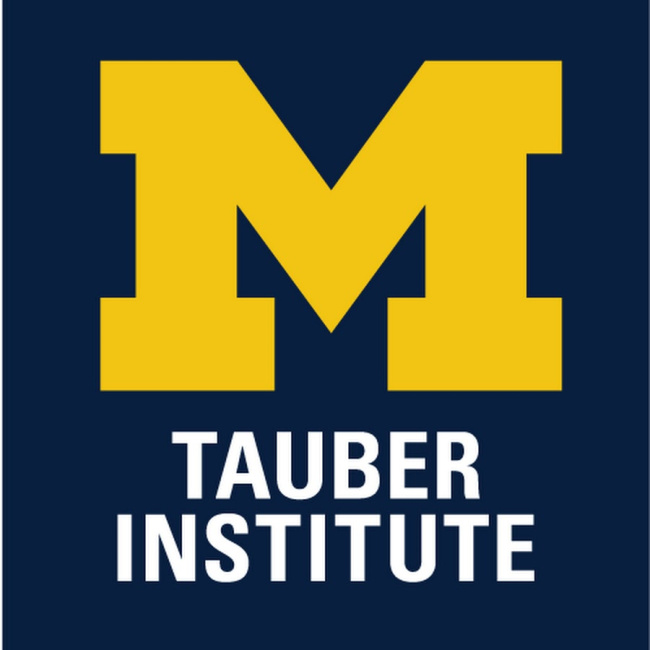
Beginning from seminal efforts by Brian Talbot at the Michigan Business School in the early 1990s, the Tauber Institute for Global Operations was designed to bring business and engineering students together for a world-class education in operations. Students would take classes in both business and engineering and complete team projects with companies. The projects were scoped to incorporate both business and engineering content, addressing important problems that had a VP-level champion at the sponsoring company. The institute was innovative by offering additional training to students beyond operations: leadership training, communications training, and providing students the opportunity to organize conferences, etc. In addition to its impact on students and companies, the Institute has for years served as an important mechanism fueling the technology and operations faculty's relevant, problem-driven research by putting them in touch with practitioners at leading companies around the world. Since its foundation, more than 1,500 graduates have completed the program as Tauber Fellows, there have been 720 summer projects executed at 145 companies, and the Institute was honored in 2012 with the prestigious UPS George D. Smith Prize from INFORMS.
















